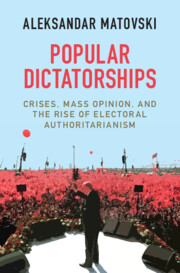Book contents
- Popular Dictatorships
- Popular Dictatorships
- Copyright page
- Dedication
- Contents
- Figures
- Tables
- Acknowledgments
- 1 A “Perfect Dictatorship?” The Puzzle of Electoral Authoritarianism
- 2 Crises, Popular Opinion, and Electoral Authoritarianism
- 3 The Crisis Roots of Electoral Authoritarianism: A Macro-Level Analysis
- 4 The “Strongman” Electoral Authoritarian Appeal: A Comparative Analysis
- 5 Crises, Popular Opinion, and the Realignment of Political Competition in Russia
- 6 Is Russia Unique? The Strongman Heresthetic in Comparative Perspective
- 7 Conclusions and Implications
- Bibliography
- Index
4 - The “Strongman” Electoral Authoritarian Appeal: A Comparative Analysis
Published online by Cambridge University Press: 04 November 2021
- Popular Dictatorships
- Popular Dictatorships
- Copyright page
- Dedication
- Contents
- Figures
- Tables
- Acknowledgments
- 1 A “Perfect Dictatorship?” The Puzzle of Electoral Authoritarianism
- 2 Crises, Popular Opinion, and Electoral Authoritarianism
- 3 The Crisis Roots of Electoral Authoritarianism: A Macro-Level Analysis
- 4 The “Strongman” Electoral Authoritarian Appeal: A Comparative Analysis
- 5 Crises, Popular Opinion, and the Realignment of Political Competition in Russia
- 6 Is Russia Unique? The Strongman Heresthetic in Comparative Perspective
- 7 Conclusions and Implications
- Bibliography
- Index
Summary
Chapter 4 challenges the prevailing view in the current literature that electoral authoritarian regimes rely on a hodgepodge of inconsistent legitimizing strategies, opportunistically drawn from various disparate platforms and ideologies. Using cross-national data from the Comparative Manifestos Project Dataset (Volkens et al. 2016), this chapter shows that the campaign strategies and rhetoric of electoral autocracies have instead followed a remarkably consistent pattern. Practically without exception, they have embraced the elected strongman appeal, which justifies their rule as a popularly mandated response to a national emergency.At the same time, electoral autocracies have emphasized their allegedly greater respect for democracy and the interests of the people, as compared to their opponents, in their campaigns. These seemingly contradictory appeals closely match their core legitimizing doctrine outlined in Chapter 2: that in times of crisis, the most democratic system is the one that represents the popular demand to restore stability by any means necessary.
Keywords
- Type
- Chapter
- Information
- Popular DictatorshipsCrises, Mass Opinion, and the Rise of Electoral Authoritarianism, pp. 133 - 166Publisher: Cambridge University PressPrint publication year: 2021

